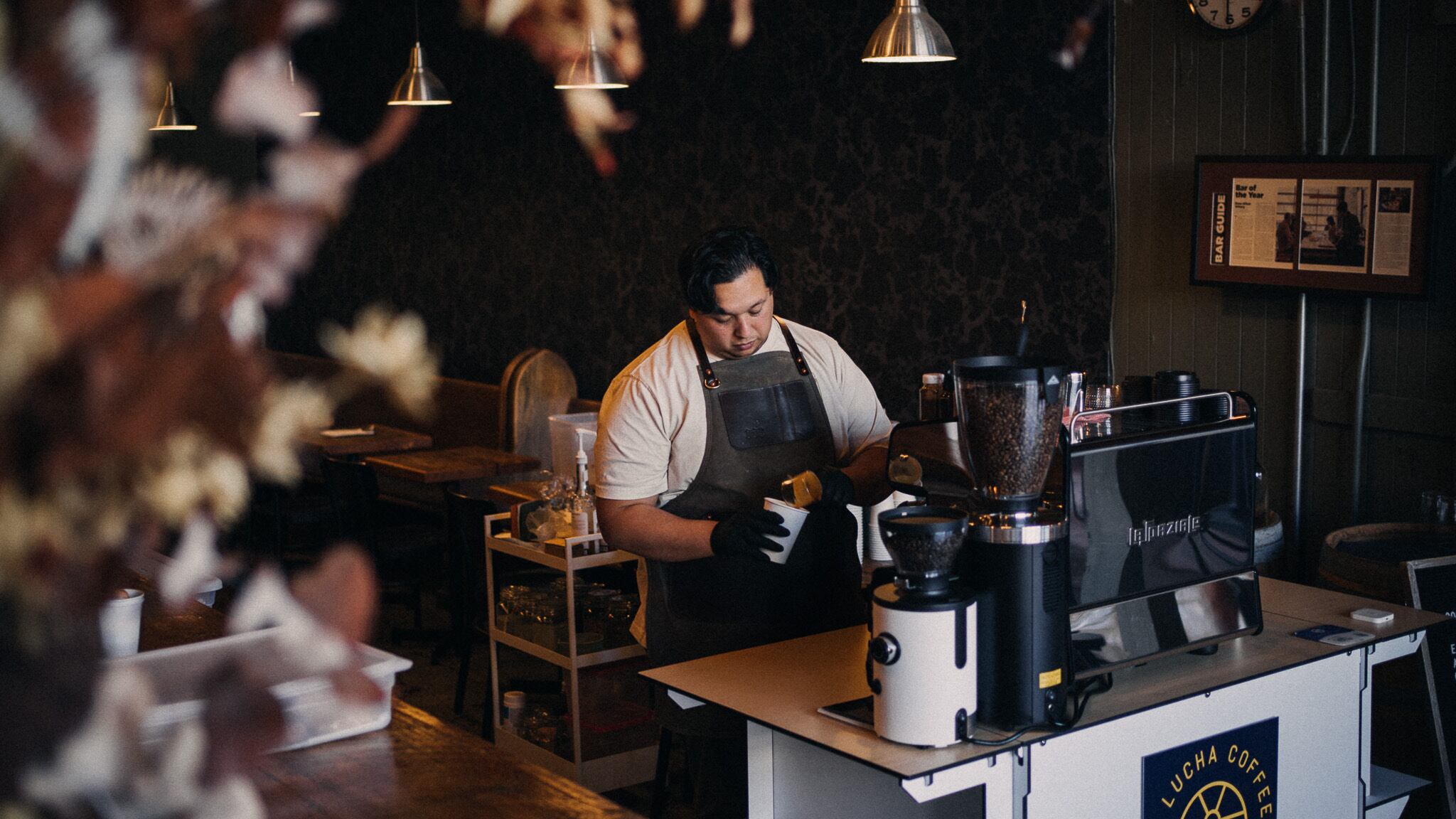It’s an almost universal experience for kids of the Latin community: You’d go to your abuela’s house for a holiday or birthday party or simply for the chisme, have a cafecito and enjoy some mazapán.
“Everybody and their grandma knows about mazapán,” says Braulio Gonzalez, owner and operator of La Lucha Coffee, a new cart inside the Buckman neighborhood’s Enso Winery that opened in November. “For me it was a nostalgic candy growing up. It’s something that is just so synonymous with Mexican culture, so I really wanted to bring that here.”
At La Lucha, customers will find a variety of Latin-inspired specialty coffee drinks, including a Mexican mocha, an horchata latte and, of course, a mazapán latte.
Not to be confused with marzipan, a similar confection made with nuts, such as almonds, mazapán is a popular traditional Mexican candy made with peanuts, which is a legume. The treat is so popular, in fact, that there’s an official Día del Mazapán on Jan. 12. Though there are other worthy choices like Mazapán Azteca, Pirhuán and Las Sevillanas, Gonzalez uses perhaps the most recognizable candy brand in the mazapán latte: De la Rosa, memorable for the iconic and enticing red rose on its packaging.
Mazapán is often enjoyed as a dessert on its own, typically in the form of a small disc or puck, but it can also be used in recipes for conchas, paletas and more. With the peanut-based treat’s particularly crumbly texture, this presented a challenge when trying to incorporate it into a coffee drink, so Gonzalez says he took a different approach and created a syrup, which is made with a De la Rosa spread (an almost impossible to find delicacy in Portland), ground-up mazapán, and water. Combined with a milk alternative of one’s choice (oat milk being the default, though customers can opt for others), the result is a maltlike concoction—softly sweet but not overly so, the taste of which lingers delicately on the palate. The grit of the mazapán is unmistakably present, which may not be to everyone’s liking, but if it is, it’s a satisfyingly chewy treat, something fun to savor in between sips.
The first sips of the mazapán latte transport the taste buds back to Grandma’s house, if one were lucky enough to grow up somewhere with plenty of little De la Rosa pucks to unwrap, carefully picking at them so as to not spill crumbs on her freshly vacuumed carpet. It takes a special kind of drink to invoke such a vivid sense of time travel, and La Lucha makes the journey a smooth ride.
Gonzalez’s specialty drinks create something Latin-inspired and offer dessert-influenced lattes that aren’t overly sweet. The mazapán latte achieves both of these goals. But if mazapán’s natural sweetness sounds too saccharine, Gonzalez recommends its spectral opposite, the Mexican mocha. Where the mazapán latte is soft, sweet and round in its flavors, the Mexican mocha—though sweet in its own right—is mostly sharp, spicy and complex, made with 100% Peruvian cacao, vanilla, cinnamon, nutmeg, cayenne pepper and ancho chili powder, topped with several spritzes of orange extract.
Of course, coffee in Portland is not a brand-new concept—not even at Enso. The winery has previously hosted coffee carts that fared well but ultimately closed down. Gonzalez hopes La Lucha stands out from his cart’s forebears by focusing on mostly vegan, Latin-inspired drinks. The only non-vegan drink on the menu is the horchata latte made with powdered milk. Gonzalez hopes to add to the growing community of Latin-inspired coffee shops like downtown Portland’s Cadejo Coffee, or La Perlita on the northbound side of North Interstate Avenue at Church Street.
“There are Latin coffee businesses here but not enough, especially with the fact that a majority of the coffee is coming from Latin America,” Gonzalez says. “So to me that representation needs to be more.”
DRINK: La Lucha Coffee at Enso Winery, 1416 SE Stark St., 503-267-0934, laluchacoffe.com. 7 am–2:30 pm Monday–Friday, 6:30 am–12:45 pm Saturday, 8 am–12:45 pm Sunday.
